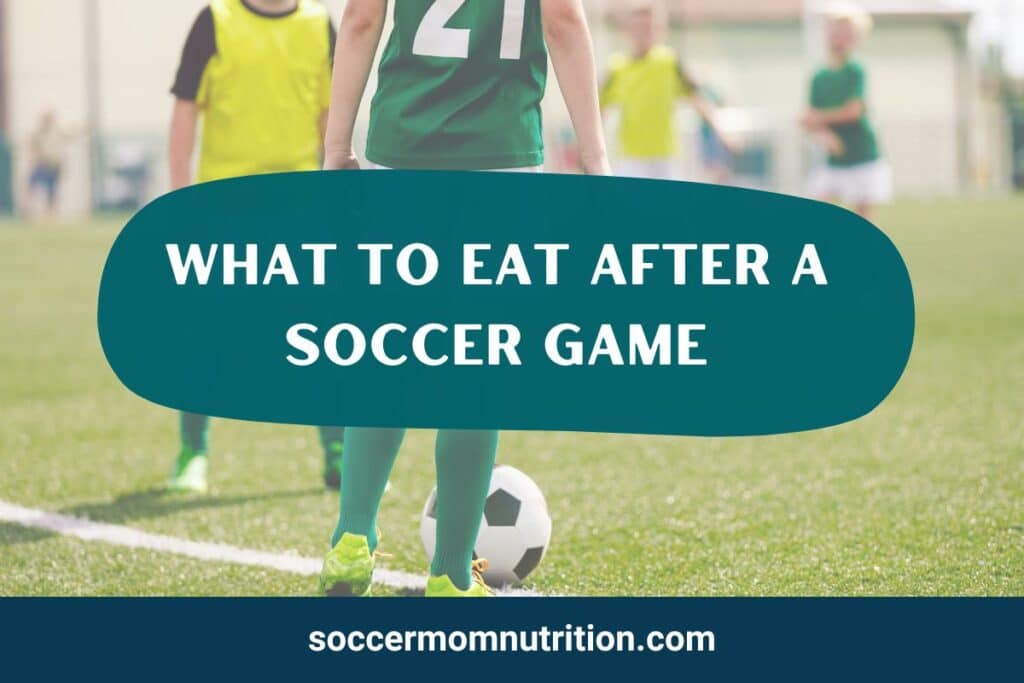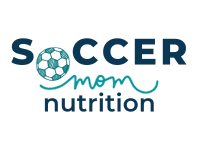What to Eat After a Soccer Game: A Guide for Soccer Players
By the end of your soccer game, you’ve wiped out your energy stores so it’s important you know what to eat after a soccer game so that you can refuel and be ready for your next training or match.
In fact soccer players can run up to 6-7 miles during a game.
Whether you play for fun or competitively, you need to have a soccer nutrition plan for your energy needs before, during and after the game. This can help you play better, feel better and get stronger.
In this blog post, we will focus on what to eat after a soccer game to help you recover faster, replenish your energy and repair your muscles.
We’ll also answer some common questions about what soccer players should know about what to eat after a soccer game and why it matters.

Why is post-game nutrition important
After a soccer game, your body is in a state of stress. You have used up a lot of your glycogen stores (the main source of energy for your muscles), you have lost fluids and electrolytes through sweating and your muscles need to be repaired. (1)
All of these factors can affect your performance, recovery and health if not taken care of properly.
That’s why post-game nutrition is important.
What are the 3 main aims of the post-game meal
The 3 main aims of the post-game meal are (2):
- To replenish the glycogen (carbohydrate) stores in your muscles and liver that you used up during the game
- To provide protein to repair the muscle damage and stimulate muscle growth
- To rehydrate your body and replace the fluids and electrolytes that you lost through sweat
Additionally, proper post game nutrition can help to:
- Reduce inflammation and soreness
- Support your immune system
- Prepare for your next game, training session or training run
The 3:1 ratio
Generally for post-game nutrition if you follow a 3:1 ratio of carbohydrates to protein you’ll get enough carbs and protein to recover. (3)
For every gram of protein you eat, you should eat three grams of carbohydrates.
This ratio helps you optimize your glycogen synthesis (the process of storing glucose in your muscles) and muscle protein synthesis (the process of repairing and building new muscle tissue).
For example, if you weigh 150 pounds (68 kg), you should aim for about 25 grams of protein and 75 grams of carbohydrates after a soccer game. This can vary depending on your age, gender, body size, activity level and goals.
What to eat after a soccer game-snack
Ideally, you should eat something within 30 to 60 minutes after a soccer game. This is the optimal window for your muscles to begin absorbing the nutrients they need.
However, this may not always be possible or practical depending on your schedule, availability of food or your appetite.
If you can’t eat a full meal right away, you should at least have a snack that contains some carbohydrates and protein. This can help you tide over until you can have a proper meal later on.
Some examples of good post-game snacks are and check out our post on after game snack ideas:
- Banana + string cheese
- Orange + jerky
- Low fat greek yogurt + granola
- Peanut butter and jelly sandwich on whole grain bread
- Pretzel chips with hummus
- Chocolate milk + rice krispy treat
- Smoothie with milk, banana, berries and protein powder
- Trail mix with dry cereal, nuts and dried fruit
- Muffin + milk
If you can eat a meal within an hour or two after a soccer game, you should choose foods that are rich in carbohydrates, protein, healthy fats, fiber, vitamins, minerals and antioxidants.
These foods can help you replenish your energy, repair your muscles, reduce inflammation and support your overall health.
Make sure to include water and sports drinks to rehydrate and replace electrolytes.
It’s always good to stash some shelf stable snacks in your gear bag or car so that you can have something right away when you need it.
What is a post-match meal
A post-match meal is the meal that you eat after a soccer game, usually a few hours after finishing. This meal should be like your post-game snack but bigger and more balanced.
It should have carbs, protein, healthy fats and lots of veggies (color). The goal of this meal is to keep filling up your energy stores, support your muscle recovery and give you important vitamins and minerals for your overall health.
Some examples of good post-game meals are:
- Burrito or burrito bowl with rice, beans, vegetables, and chicken, beef or tofu
- Sandwich with whole wheat bread, turkey, cheese, lettuce, tomato, bean salad
- Grain bowl with quinoa, salmon, broccoli and avocado
- Chicken stir-fry with brown rice and mixed vegetables
- Pasta with lean meat red sauce and mixed green salad with nuts
- Poke bowls with tuna or salmon, brown rice, cucumber, edamame, seaweed salad
- Turkey burger with whole wheat bun, avocado, cheese, salad, sweet potato fries
- Chicken salad with quinoa, avocado, nuts and dressing
- Waffles with scrambled eggs, fresh fruit, low fat greek yogurt
- Breakfast frittata with lean sausage, roasted veggies, side whole grain toast
- Vegetable omelet with whole wheat toast and fruit
- Tuna sandwich with whole wheat bread, lettuce/tomato/cucumber, and yogurt
- Bean and cheese quesadilla with salsa and guacamole and shredded lettuce
The performance plate method
Another way to plan your post-game meal is to use the performance plate method. This is a simple method that helps you visualize how much of each food group you should put on your plate.
The performance plate has four sections:
- 50% of the plate should be filled with high-quality carbohydrates such as whole grains (brown rice, quinoa), starchy vegetables (potatoes), fruits (berries), or dairy products (milk)
- 25% of the plate should be filled with lean protein such as chicken, turkey, fish, eggs, tofu or beans
- 25% of the plate should be filled with fruits and vegetables such as berries, oranges, yogurt or cheese
- Side of healthy fats such as avocado, nuts, seeds or olive oil
The performance plate can help you balance your macronutrients and micronutrients and ensure that you are getting enough variety and quality in your diet. You can adjust the portions and types of foods depending on your preferences, goals and needs.
How do you recover from a soccer game
Besides eating and drinking well after a soccer game, there are other things you can do to speed up your recovery and prevent injuries. Some of them are:
- Stretching your muscles gently to relieve tension and improve blood flow
- Applying ice or cold packs to any sore or swollen areas to reduce inflammation
- Taking a shower or bath to relax your muscles
- Getting enough sleep to allow your body to heal and restore itself
- Eating a late evening snack to top off fuel stores
- Resting for at least 24 hours before engaging in any intense physical activity again
Conclusion
What you eat after a soccer game can make a big difference in your recovery and performance.
By having a snack or a meal within an hour or two after the game and using the performance plate concept, you can optimize your post-game nutrition and get ready for your next challenge.
Remember to also drink plenty of water and fluids to rehydrate your body and replenish your electrolytes.
Check out our posts on dinner ideas, what to eat after a morning run and how to meal prep and plan. Also if you’re planning a team dinner check out some of our best ideas.
What’s your favorite post game meal?
Join our mailing list and get our FREE Pre-Activity Fueling Guide.
Stephanie Magill, MS, RD, CD, FAND has over 22 years of experience in public health and nutrition. As a performance registered dietitian nutritionist, Stephanie specializes in sports nutrition and provides simple and actionable information so that athletes can be well fueled for high performance on and off the field. Stephanie has a Master’s Degree in Nutrition and is a Fellow of the Academy of Nutrition and Dietetics.

